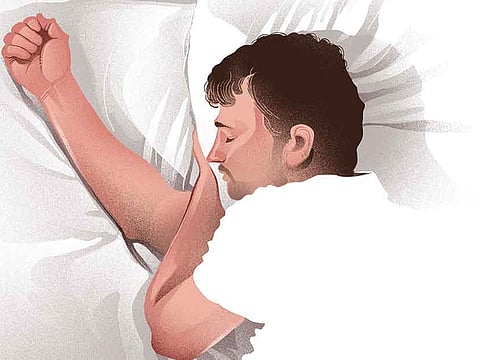Why you really need to sleep better
The damage caused by a single restless night can be huge. We should all aim to get more winks and better rest

The science of sleep has begun to show clear links between lack of sleep and a raft of different ailments — including Alzheimer’s disease. In the Forties, the average British adult was sleeping a little under eight hours a night. Now they make do with six hours and 49 minutes. Street lights, electronic devices and cramming family life around working long hours have conspired to devastate our sleeping and the consequences for a sleep-deprived nation are sobering. It is curious that both Margaret Thatcher and Ronald Reagan, two world leaders who made a virtue of only sleeping four to five hours a night, both ended up with Alzheimer’s.
Listen: How to get a good nights sleep
We already have more than 850,000 dementia-sufferers in the UK and the Alzheimer’s Society estimates that 225,000 people in the UK will develop dementia this year — that’s one every three minutes. Alzheimer’s — named after Aloysius Alzheimer, the German doctor who identified the devastating brain disease in 1901 — is the most common form of dementia, affecting 62 per cent of those diagnosed.
Could sleep offer a way of slowing down the onset of the disease — or help prevent it altogether? Sleep quality generally deteriorates with age, which is linked to a decline in memory and in patients with Alzheimer’s disease the disruption of sleep is far more exaggerated. My work suggests that sleep and Alzheimer’s could be inextricably linked. Normal, beneficial sleep has two key phases: lighter REM (rapid eye movement) sleep and deeper, non-REM sleep during which our brain produces waves or “spindles” that aid the memory. Information gathered during the day goes into the hippocampus, the short-term memory area of the brain and the deep-sleep spindles essentially hits the save button, moving those information files into long-term storage.
Sleep disruption and memory impairment as part of the Alzheimer’s story is increasingly strong, and sleep offers a mechanism for the disease, a possible diagnostic tool, a route for therapy and finally a potential hope for prevention.
Around six years ago, my team discovered that beta-amyloid — the sticky, toxic protein that is the hallmark of Alzheimer’s — does not build up all over the brain in a consistent manner, it builds up in specific parts of the brain. The big surprise was that it did not build up at all in the areas of the brain associated with memory, even though loss of memory is most associated with Alzheimer’s.
Instead, we found the protein deposited in the brain region responsible for the generation of deep, non-REM sleep.
In a vicious cycle, the more protein there was in the brain, the less deep sleep the patient had. Which turned out to be critical when Maiken Nedergaard, a fellow sleep scientist working in the US, made a spectacular discovery. Working with mice, she found that there is a network in the brain — known as the glymphatic system — which clears toxins from the brain in the same way the lymphatic system drains toxins from the body.
Toxic, amyloid buildup
The fascinating aspect of the discovery was that this clearing of the metabolic detritus that accumulates as the body uses energy kicks into gear during deep, non-REM sleep. It is essentially a power cleanse for the brain. One of the toxic elements that builds up as we’re awake is beta-amyloid, and what keeps us off the path to Alzheimer’s disease is that the glymphatic system comes to our rescue at night. It washes the brain by bathing it in cerebro-spinal fluid. This pulsing, washing mechanism washes away that sticky, toxic, amyloid protein. And that is what Nedergaard discovered, that there is this pulsing, washing mechanism, washing away the amyloid protein at night.
It takes just one night of disrupted sleep for beta-amyloid to start building up in the animal brain. That is a causal demonstration that if you don’t get that deep sleep, you get an immediate build-up of that Alzheimer’s-related protein. If you join it together with our findings, it means that if you are not getting sufficient sleep across your lifespan, you are going to build up this amyloid protein. The more of it that builds up, the less deep sleep that you are able to generate — and the less deep sleep that you have, the more Alzheimer’s protein you develop. It becomes a self-fulfilling prophecy of disease risk.
We are now starting a new strand of research, aimed at trying to restore deep sleep in dementia patients. Using young, healthy adults, he has shown that it is possible to boost deep sleep brainwaves using electrical impulses.
While no one knows whether sleep could become a treatment for dementia patients, an informal experiment on people with sleep apnoea — a disorder that causes disturbed sleep as the patient struggles for breath — suggests it could. Patients who were taught sleep-improving strategies found improved sleep staved off the onslaught of cognitive decline by almost 10 years.
Sleep offers hope from a diagnostic perspective, an understanding of the mechanism, and as a therapy. If you wanted an insurance policy against Alzheimer’s, prioritising sleep across your lifetime is one of the best things.
And, it’s never too late.
Some people take our research to mean that if they’ve been too “busy” to sleep for more than a few hours a night and they are in their late 40s, their fate is sealed. Not so. You can’t get back what you’ve lost, but it’s never too late to start sleeping better.
So we should all aim to get more and better rest — starting tonight.
— The Telegraph Group Limited, London 2018
Matthew Walker is an author and sleep expert. His book Why We Sleep: The New Science of Sleep and Dreams is published by Penguin Books Ltd.


